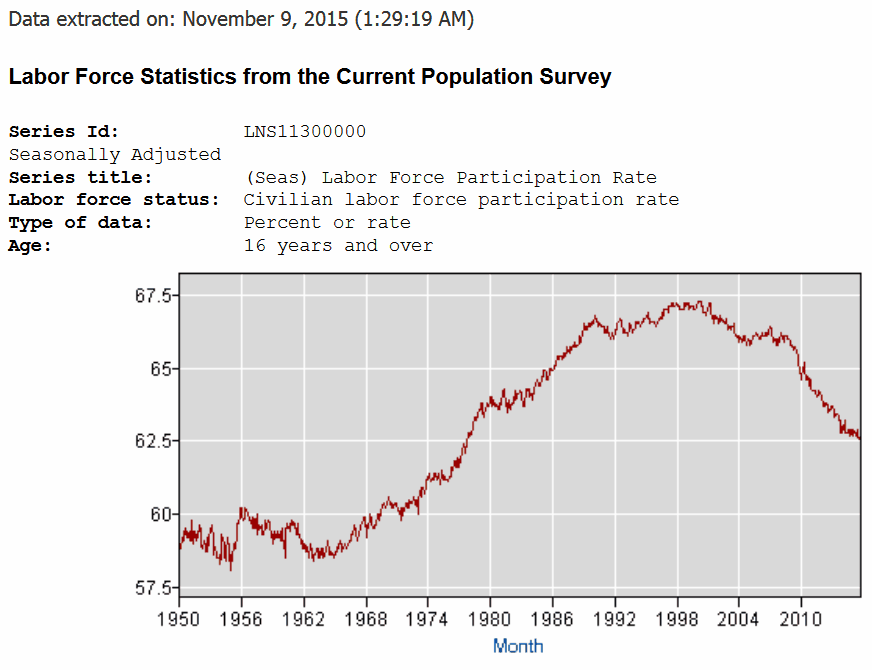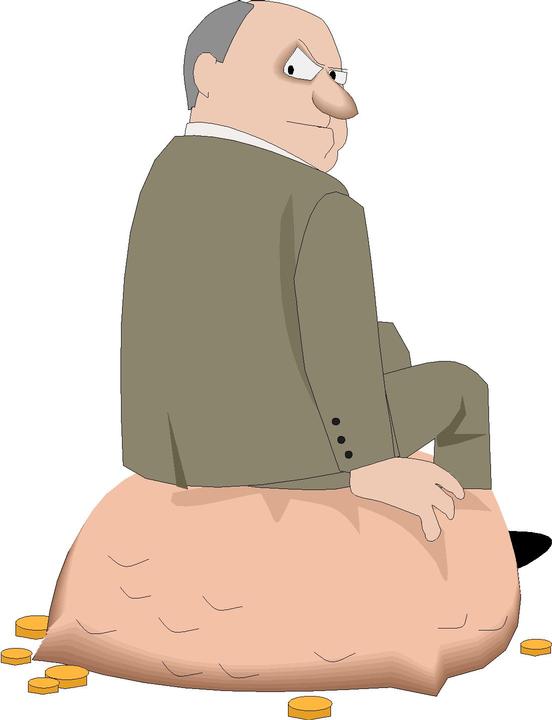Spend twenty minutes per week browsing Investment Tools and you will be better informed than most financial experts!
Monday, December 07, 2015
QUICK OVERVIEW
- (The Economist) November was another strong month for America’s labour market. The economy added 211,000 jobs, according to data published on Friday; figures for September and October were revised up. The unemployment rate stayed at 5%. The healthy report makes an interest-rate rise this month look all but certain. This week Janet Yellen, head of the Federal Reserve, hinted that an increase was on the way.
- (The Economist) The European Central Bank headed in the other direction, though not as far as expected. On Thursday, the ECB pushed its deposit rate further into negative territory, from -0.2% to -0.3%, and promised to extend its bond-buying programme by six months, to March 2017. But markets had anticipated more. European share prices fell and the euro rebounded from recent lows.
- Xi Jinping, China’s president, told other world leaders in Paris that their talks mark a “new starting-point” in tackling climate change, his own capital was stewing in a pea-souper of smog. Yesterday Beijing’s air-quality index topped 600: “Hazardous…everyone may experience…serious health effects”.
- The Debt held by U.S. farmers in 2015, expressed in proportion to net income, is estimated at 6.3 to 1. One has to go back to the 1980s to find another 6 to 1.
- (Zillow) With the majority of renters in the largest metros putting about 30 percent of their monthly income toward a rental payment, saving money for a 20 percent - or even 10 percent - down payment is extremely difficult. First-time homebuyers and millennials are left trying to find other ways to break into the housing market, turning to friends and family for financial help. In 2014 alone, 13 percent of home purchases were bought using a loan or gift from friends or family for the down payment
- Euro Zone third-quarter GDP growth slowed to 0.3%.
- (Economist) The taxation of multinationals is getting an overdue shake-up. At the G20 summit in Turkey this weekend, the leaders of the world’s biggest economies are expected to approve the biggest overhaul in decades. The OECD drew up the new standards (snappily entitled “Base Erosion and Profit Shifting”) over two years. They are intended to make country-by-country corporate reporting more transparent, and to close loopholes that allow multinationals—particularly technology and drug companies with lots of easily movable assets, such as intellectual property—to shift profits to tax havens. The OECD thinks the reforms could help governments claw back more than $200 billion a year. Approval is all but guaranteed: the G20’s finance ministers have already given BEPS the thumbs-up. The next stage is to implement the reforms. But doing it uniformly won’t be easy: national parliaments will want to bend the rules.
- (Economist) ExxonMobil was sent a subpoena by New York state’s attorney-general, requiring it to hand over documents regarding what the company knew about climate change, and when. The state is asking whether Exxon was forthcoming with its investors about the results of its own decades-long research into carbon emissions’ effects on the atmosphere—and the liabilities faced by the world’s largest publicly traded oil company.
- China has decided to end its decades-long one-child policy, the state-run Xinhua news agency reports. Couples will now be allowed to have two children. Condom shares fell, however shares in companies that make diapers, strollers and baby food have been bolstered. However, the policy shift will make no difference to the workforce for almost 20 years when China will be in the full grip of a demographic crunch.
- To boost more coordinated development of the Beijing-Tianjin-Hebei region, 23 new intercity rail lines will be built by the end of 2030, according to the company that will make the investment.
- China announced plans to build a nationwide charging-station network that will fulfill the power demands of 5 million electric vehicles by 2020.
- The European Union predicted that 3m more migrants could arrive by the end of 2017.
- Almost half of investors surveyed by E*TRADE expect a market downturn.
- (Spiegel) Ahead of the planned lifting of Western sanctions against Iran, businessmen from around the world are visiting the country, and as one group from Germany discovered, there is no shortage of opportunities
- The Bank of Japan’s main inflation gauge dropped for a second consecutive month as the effects of low oil prices continue to take a toll, keeping Governor Haruhiko Kuroda distant from his 2 percent inflation target. Consumer prices excluding fresh food declined 0.1 percent in September from a year earlier
- Contracts to buy previously owned U.S. homes fell unexpectedly in September, a warning sign that the housing market recovery may be stumbling. The National Association of Realtors said on Thursday its Pending Home Sales Index, based on contracts signed last month, dropped 2.3 percent to 106.8, the second lowest reading of 2015.
- Condos are appreciating faster than single-family homes in markets across the U.S., especially where job markets are thriving or urban renewal is underway, according to Zillow® Condos in the U.S. are appreciating at a rate of 5.1 percent, compared to the 3.7 percent appreciation among single-family homes. YoY Iceland's fish catch decreased by 6.7 % in September
Sunday, November 08, 2015
Interesting Chart of the U.S. Labor Force Participation Rate
There are an estimated 10,000 Baby Boomers retiring each day..
A Council of Economic Advisers (CEA) study estimates that 55% of the decline in the LFPR
from the end of 2007 to the end of 2014 was entirely due to demographic reasons.

Sunday, October 25, 2015
QUICK OVERVIEW
- Lazaridis added that “in the case of the Capesize and Handysize vessels, this looks to be a double gain, as we only need to see a similar rise in interest as the one noted last year during the same period in order to generate an equal improvement in freight levels, given as the fleet size of both these size segments has remained overall unchanged during the past 12 months. Taking the same consideration for Panamaxes and Supramaxes things aren’t as rosy, as their respective fleets have shown a notable increase since then. Nevertheless, things have been more positive for these size segments thanks to the improving demand from India which is driving bigger interest in the Pacific for these vessels. As such it wouldn’t be an exaggeration to place a base case scenario of the Baltic TCA rates in the Supramaxes and Panamaxes surpassing at some point the US$ 10,000/day mark before the year closes, while Capesizes should easily reach the US$ 25,000/day mark”, Allied’s analyst noted.
- The Federal Reserve is still expected to raise U.S. interest rates in December but signs the labor market may be in a soft patch have dented confidence the central bank will pull the trigger, according to a Reuters poll
- Eurozone’s trade surplus in August declined more-than-forecast from the previous month, as exports declined and imports increased, figures from Eurostat showed Friday.
- The seasonally adjusted trade surplus fell to EUR 19.8 billion from EUR 22.4 billion in July. Economists had expected EUR 22.1 billion surplus.
- Exports dropped 1.3 percent from July, while imports grew 0.2%
- Factory output fell in September for a second month as high inventories and lukewarm demand from overseas customers kept American producers bogged down. The 0.1 % drop at manufacturers, which make up 75 % of all production, followed a revised 0.4 % decrease the prior month, a Federal Reserve report showed .
- China's role in helping revitalize infrastructure and financial investment across Africa is gaining momentum ahead of the forthcoming Forum on China-Africa Cooperation (FOCAC) summit set to be held in South Africa in December, Kenyan expert said.
- China increased its holding of U.S. Treasury securities in August, while Japan cut its share.
- U.S. recession a little more likely? The probability that the world’s biggest economy will enter a recession in the next 12 months jumped to 15 %, its highest level since October 2013, according to economists surveyed Oct. 2-7 by Bloomberg. ...
- (MW) Federal Reserve officials now seem open to deploying negative interest rates to combat the next serious recession even though they rejected that option during the darkest days of the financial crisis in 2009 and 2010. “Some of the experiences [in Europe] suggest maybe can we use negative interest rates and the costs aren’t as great as you anticipate,” said William Dudley, the president of the New York Fed, in an interview on CNBC.
- Finance leaders from the Group of 20 largest economies backed an international agreement to limit tax avoidance by multinational corporations. The international effort, which represents the most wide-ranging overhaul of tax rules in decades, is meant to curb revenue losses from companies keeping profits overseas.
- MoM German exports slumped by 5.2% in August, pushing down the trade surplus, adjusted for seasonal variations, to EUR19.6 billion ($22 billion), the Federal Statistical office said . That was the steepest decline in German exports since January 2009, an economist at Destatis said.
- The Bloomberg US Consumer Comfort Index improved to 44.8 in the period ended Oct. 4, pushing above this year’s average, from 43. The measure has advanced 4.6 points over the last three weeks, the biggest gain for any comparable period since May 2009.
- Britain’s Construction output plunged by a monthly 4.3% percent, its biggest fall since December 2012, contrasting with a median forecast for growth of 1.0 %.
- China’s retail sales growth slowed during the week-long National Day Holiday, Ministry of Commerce data showed, adding to concerns about weakness in the world’s second largest economy.
- The bond market isn’t buying what Feds Janet Yellen is selling on inflation. While she reiterated last week that the Fed expects inflation to gradually rise back near 2% - bonds are demonstrating this is bs..
- U.S. consumer confidence rose in September to 103.0 from a revised 101.1 in August. Forecasters had it dropping to 96.0…
- (MarketWatch) -- U.S. house prices rose 0.6% in July, led mostly by western markets including Portland and San Diego, according to the S&P/Case-Shiller 20-city composite released Tuesday. After seasonal adjustment, prices slipped 0.2%. Over the last 12 months, prices have climbed 5%, led by 10.4% growth in San Francisco and 10.3% growth in Denver.
- Fourteen cities reported greater price increases in the year ending July 2015, and every city saw price gains.
- U.S. New-home sales rose 5.7 % last month to a seasonally adjusted annual rate of 552,000m - that is the strongest pace since February 2008, near the beginning of the Great Recession.
- According to the most recent weekly data from credit card data tracking website CreditCards.com, the national average for U.S. credit card interest rates is 15% So, unless this is paid off - it'll double every 4.8 years (rule of 72)
- According to a report from the Federal Reserve in July, revolving debt rose to $914.6 billion, up $4.3 billion MoM. This is the highest level of consumer-carried debt since December 2009, implying a YoY growth rate of 5.7%.
- China’s top government-affiliated think tank has lowered its growth estimate for 2015, saying the economy is unlikely to deliver the 7% annual growth. It now expects growth of 6.9%
- Goldman Sachs released a September 22 research note that predicted that coal will decline and never come back. “Peak coal is coming sooner than expected,” the investment bank concluded.
- “ Germany’s wages rose 2.7 % YoY
- Dry bulk market fundamentals are still grim despite funds buying into dry bulk firms
- To provide complete care for its residents, Chaseley Trust — a venerable British nursing facility housed in an ornate seaside mansion — offers amenities such as a movie theater, a gymnasium and a pool table. It also, from time to time, invites prostitutes and strippers to provide their services to residents.
Monday, September 07, 2015
Charts are up-to-date
Some that could be of interest:
- Vix ratio ROC
- S&P Cycle (short term low tomorrow?)
- DJIA CPI adjusted - is back to 2000 level
- XAU and what a dog it has been (support?)
- NYSE new weekly highs - can it go lower?
- Investors Intelligence
- Gold / Crude ratio
- And if you want to scan all charts, one right after another, you can do so easily here
Sunday, September 06, 2015
QUICK OVERVIEW
- U.S. gains 173,000 jobs in August; unemployment 5.1%
- The uncertainty over whether the Fed will raise interest rate in two weeks still holds although the August jobs report showed the U.S. unemployment rate fell to the level the Fed considers to be full employment.
- U.S. hourly wages rise 0.3% in August, up 2.2% YoY
- Iranian consumers crave US and other western goods, endangering Chinese and Indian foothold.
- U.S Factory orders rose 0.4% in July
- U.S. construction projects rose 0.7% in July to a seasonally adjusted annual rate of $1.08 trillion, the highest level since May 2008.
- U.S. Pending Home Sales, a forward-looking indicator based on contract signings, marginally increased 0.5% to 110.9 in July from an upwardly revised 110.4 in June and is now 7.4 percent above July 2014.
- U.S. economy grows 3.7% in Q2
- In the euro zone Germany has the lowest unemployment at 4.7% Greece the highest at 25%
- France is at 10.4%
- South Korea's export plunged 14.7% YoY
- YoY Macau's GDP shrank by 26% in Q2. Casino revenues are down some 40% - all thanks to a crackdown by China on corruption.
- The dry bulk shipping market will remain in recession due to contracting demand for iron ore and coal, and any recovery is not expected until 2017, according to the Dry Bulk Forecaster report published by global shipping consultancy Drewry.
- Falling demand and oversupply has severely impacted commodity values, with iron ore and coal prices in virtual free fall.
- Less than 60 bulkers were contracted in the first seven months of 2015, a drop of 91% YoY, and down from more than 1,200 in full year 2013. Combined with the firm pace of deliveries, this has led to a 20% decline in the bulkcarrier orderbook since the start of 2015..
- Mario Draghi says Europe is ready to counter China slowdown and Brussels will use the tools at its disposal to prevent a broader crisis.
- August was the worst month for British retail sales since the global financial crisis of 2008. Accountancy firm BDO said its monthly high street sales tracker (HSST) showed a 4.3% YoY fall in August sales — the biggest drop since November 2008 and the sixth monthly dip ...
- Indian economy grows by 7% in first fiscal quarter.
- Euro-zone jobless rate improves to 10.9 % in July
- Philippine inflation at record low of 0.6% in August
- British construction PMI up slightly to 57.3 in August
- YoY global house prices rose 0.1%, so reports London-based property agent Knight Frank - the weakest rate of growth since the final quarter of 2011. Hong Kong-led with a 12-month increase of 20.7%, followed by Turkey (18.5%), Estonia (13.4%), Luxembourg (13.2%) and Ireland (10.9%). China, with a price decline of 5.7%, ranked 52nd on the list, while house prices in Greece, Cyprus, Ukraine and Dubai dropped by 5.9%, 6.5%, 12% and 12.2% respectively.
- (MW) Oil futures pared losses after data from Baker Hughes released Friday showed that the number of active oil-drilling rigs fell 13 to 662 as of Sept. 4. The total active rig count, which includes natural-gas rigs, was at 864, also down 13 rigs. Compared to last year, the total rig count has fallen by 1,061, with the oil rig count down 922.
- Interested in Tech? take a look at INTC's presentation in Berlin
- The Donald said the stock market rout was caused by "poor planning" and allowing China and Asia to dictate the agenda. "This could get very messy!" he said. Trump is leading in polls to be the Republican presidential nominee. - Sarah Palin is planning to be energy secretary in the Donald's administration.
Sunday, July 12, 2015
 Killing the European Project
Killing the European ProjectCan Greece pull off a successful exit? Will Germany try to block a recovery? (Sorry, but that’s the kind of thing we must now ask.) The European project — a project I have always praised and supported — has just been dealt a terrible, perhaps fatal blow. And whatever you think of Syriza, or Greece, it wasn’t the Greeks who did it.
 EU Demands Complete Capitulation From Tsipras
In addition to requirements to cut pensions and raise sales tax, which Tsipras accepted last week, the memo demanded that officials from Greece’s creditors return to Athens with full access to government ministers and a veto over relevant legislation, according to the document.
Euro-area leaders also want Tsipras to transfer as much as 50 billion euros ($56 billion) of state assets to an independent Luxembourg-based company for sale and make him fire the workers he hired in defiance of Greece’s previous bailout commitments.
EU Demands Complete Capitulation From Tsipras
In addition to requirements to cut pensions and raise sales tax, which Tsipras accepted last week, the memo demanded that officials from Greece’s creditors return to Athens with full access to government ministers and a veto over relevant legislation, according to the document.
Euro-area leaders also want Tsipras to transfer as much as 50 billion euros ($56 billion) of state assets to an independent Luxembourg-based company for sale and make him fire the workers he hired in defiance of Greece’s previous bailout commitments.
Tuesday, July 07, 2015
 Ambrose Evans-Pritchard: ..
Ambrose Evans-Pritchard: ..Instead they were confronted with a text from the creditors that upped the ante, demanding a rise in VAT on tourist hotels from 7pc (de facto) to 23pc at a single stroke. Creditors insisted on further pension cuts of 1pc of GDP by next year and a phase out of welfare assistance (EKAS) for poorer pensioners, even though pensions have already been cut by 44pc. They insisted on fiscal tightening equal to 2pc of GDP in an economy reeling from six years of depression and devastating hysteresis. They offered no debt relief. The Europeans intervened behind the scenes to suppress a report by the International Monetary Fund validating Greece's claim that its debt is "unsustainable",..
(This from a country that has never repaid its debts. See Piketty )
Monday, July 06, 2015
QUICK OVERVIEW
- The German government signaled a tough line towards Greece on Monday, saying it saw no basis for new bailout negotiations and insisting it was up to Athens to move swiftly if it wanted to preserve its place in the euro zone. With opinion towards Greece hardening in Germany’s ruling coalition. (This from a country that has never repaid its debts. See Piketty )
- (Krugman)..even if the creditors were making sense.What’s more, they weren’t. The truth is that Europe’s self-styled technocrats are like medieval doctors who insisted on bleeding their patients — and when their treatment made the patients sicker, demanded even more bleeding.
- (Hellenic Shipping News)A new record year in dry bulk demolition under way? The monthly average for the first six months in 2015 is 3.3m DWT. In 2014 the first half year averaged at 1.33m DWT per month. April 2015 saw 5.36 million DWT being retired from active service, which was the highest on record ever for a single month.
- Overall confidence levels in the shipping industry fell during the three months to May 2015 to a level equal to the lowest rating recorded in the past seven years. Respondents complained predominantly about low freight rates and overtonnaging
- The shipping industry is experiencing the biggest dry bulk market recession since the 1980s. The uncertain global economic outlook and the increased imbalance between supply and demand have lead to historical low freight rates .The downturn seems to continue until 2017 if a viable equilibrium is not achieved..
- China is capable and confident it can maintain the capital market stable and sound, said a commentary of People's Daily, the flagship newspaper of the Communist Party of China
- China's central bank cut both the requirement reserve ratio (RRR), the amount of reserves banks required to hold, and benchmark interest rates on Saturday. The central bank cut the RRR for commercial banks serving rural areas, agriculture and small businesses by 50 basis points (bps). The RRR for finance companies, or non-bank financial institutions, will be lowered by 300 bps, the PBOC announced. Benchmark interest rates have also been cut. Interest rates for one-year lending and deposits are cut by 25 bps to 4.85% and 2% respectively.
- China's economy will grow by 6.93% YoY in the second quarter, said a report by the National Academy of Economic Strategy.
- Surging investment by Chinese companies in U.S. research labs is yielding a fast-growing trove of patents, part of a push to mine America for ideas to help China shift from being the world’s factory floor to a driver of innovation..
- Previously owned U.S. homes sold in May at the fastest pace since November 2009, driven by first-time buyers and indicating budding momentum in the residential real estate market.
- Closings on existing properties, which usually occur a month or two after a contract is signed, rose 5.1% to a 5.35 million annualized rate.
- Home rental prices are climbing across much of the United States " with the biggest gains coming from not from New York or San Francisco but Jackson, Mississippi, and Portland, Maine (Zillow)
- The volume of world merchandise trade increased modestly in the first quarter of 2015, with growth in both exports and imports registering slower growth than over the previous six months
- (Paul Krugmann)And something that even startled me: 47 percent said that they would not have the resources to meet an unexpected expense of $400 — $400! They would have to sell something or borrow to meet that need, if they could meet it at all.
- Global carbon dioxide levels break the 400ppm milestone
- India's Poor cannot pay for 150 years of pollution by the West says India's coal minister as India ramps up coal production to reach its target of 1 Billion tons of coal by 2020.
- Some top international doctors and public health experts have issued an urgent prescription for a feverish planet Earth: Get off coal as soon as possible.
- EU plans to regulate hormone-damaging chemicals found in pesticides have been dropped because of threats from the US that this would adversely affect negotiations for the Transatlantic Trade and Investment Partnership (TTIP), according to a report in The Guardian. Draft EU regulations would have banned 31 pesticides containing endocrine disrupting chemicals (EDCs) that have been linked to testicular cancer and male infertility.
- Canada’s political landscape has undergone a seismic shift with the election of a left-wing government in oil-rich Alberta.
- (Moody's) Company Total Cash $U.S. Billions:
- Apple $178.0 Dec. 27, 2014
- Microsoft $90.2 Dec. 31, 2014
- Google $64.4 Dec. 31, 2014
- Pfizer $53.6 Dec. 31, 2014
- Cisco Systems $53.0 Jan. 24, 2015
- Oracle $44.7 Nov. 30, 2014
- Johnson & Johnson $33.1 Dec. 28, 2014
- QUALCOMM $31.6 Dec. 28, 2014
- Medtronic $31.1 Jan. 23, 2015
- Merck Co. $29.2 Dec. 31, 2014
- A Gallup survey from 2013 found that libraries are not just popular, they’re extremely popular. Over 90 percent of Americans feel that libraries are a vital part of their communities. Compare this to 53 percent for the police, 27 percent for public schools, and just 7 percent for Congress, and you’re looking at perhaps the greatest success of the public sector.
 Piketty: When I hear the Germans say that they maintain a very moral stance about debt and strongly believe that debts must be repaid, then I think: what a huge joke! Germany is the country that has never repaid its debts. It has no standing to lecture other nations.
Piketty: When I hear the Germans say that they maintain a very moral stance about debt and strongly believe that debts must be repaid, then I think: what a huge joke! Germany is the country that has never repaid its debts. It has no standing to lecture other nations.
Friday, May 01, 2015
 Bernanke and the Inflationistas There’s something about inflation derp that goes straight to the ids of certain people — largely, one suspects, angry old men, though it would be nice to have hard evidence on the demographic. And they will keep regarding the Journal as the place to get the truth no matter how much money it costs them.
Bernanke and the Inflationistas There’s something about inflation derp that goes straight to the ids of certain people — largely, one suspects, angry old men, though it would be nice to have hard evidence on the demographic. And they will keep regarding the Journal as the place to get the truth no matter how much money it costs them.
Saturday, April 25, 2015
 The TPP: Toward Absolutist Capitalism
The TPP: Toward Absolutist CapitalismThere are many excellent arguments against the Trans-Pacific Partnership (TPP), two of which — local zoning over-rides, and loss of national sovereignty — I’ll briefly review as stepping stones to the main topic of the post: Absolutist Capitalism, for which I make two claims:
1) The TPP implies a form of absolute rule, a tyranny as James Madison would have understood the term, and
2) The TPP enshrines capitalization as a principle of jurisprudence.
 The Trans-Pacific Partnership and the Death of the Republic
The Trans-Pacific Partnership and the Death of the RepublicOn April 22, 2015, the Senate Finance Committee approved a bill to fast-track the Trans-Pacific Partnership (TPP), a massive trade agreement that would override our republican form of government and hand judicial and legislative authority to a foreign three-person panel of corporate lawyers.
QUICK OVERVIEW
- U.S. stocks ended higher on Friday, with both the S&P 500 and the Nasdaq Composite Index refreshing their record closing highs, as major earnings reports came out generally positive.
- (MarketWatch)Sales of new single-family homes fell 11.4% to an annual rate of 481,000 in March, pulling back from a seven-year high reached in the prior month and hitting the slowest pace since November.
- In Japan, manufacturing fell to 49.7 (est. 50.8), dropping below 50 for the first time since July 2014.
- PRNewswire/ -- Even though buyers in most markets can break even on a home purchase in less than two years, nearly half of renters in a newly released survey said their credit or finances keep them from buying a home.
- Of renters surveyed by Zillow, 16 percent said they can't qualify for a home loan, 18 percent said they can't afford taxes, maintenance and other costs associated with home-ownership, and 13 percent said they don't have enough savings for a down payment. About a quarter said they struggle to pay their rent.
- According to the survey, 82 percent of renters are long-term renters, and 57 percent are long-term renters who have lived for a long time in the same home. Just 14 percent of renters said they aren't staying long enough in the same place to buy.
- The Competitive Edge: renters searching for their next home on Zillow can easily see how long rentals have been on the market...
- U.S. gains 126,000 jobs in March, unemployment at 5.5%
- Russia's consumer price inflation hit 16.9 % in March as the country heads for recession.
- ISM services index dips to 56.5% in March from 56.9%
- China's services purchasing managers' index (PMI) was posted at 52.3 in March, up from 52 in February
- Corn inventories of 7.745B bushels as of March 1 are up 10.5% YoY and stand against trade estimates for 7.609B. Acres planted drop 1.398M YoY.
- Wheat stocks of 1.124B bushels are up from 1.057B YoY and stand against estimates for 1.141B. Acres planted drop 1.648M YoY.
- Soybean inventories of 1.334B bushels are up from 994M YoY and stand against estimates for 1.348B. Acres planted gain 934K YoY.
- The number of Americans filing new claims for jobless benefits fell more than expected, while activity in the services sector hit a six-month high in March, underscoring the economy's solid fundamentals despite a recent softening in growth. The good news is that claims and the services sector data suggest the economy has gained some momentum heading into the second quarter.
- US durable goods orders fell 1.4 in February
- U.S. Wages climbed by 1.3% from Q2 of 2012 to Q2 of 2014, compared to a 17% increase in home prices during that time, according to RealtyTrac.
- The German economy, the biggest in Europe, is expected to keep its growth momentum in the first half of 2015 and continue to expand as strongly as at the end of 2014, Germany's central bank said on Monday in its monthly bulletin.
- To boost economy, Sweden lowered its repo rate, the rate at which the central bank lends to commercial banks, from minus 0.1 percent to minus 0.25 percent and announced that it would buy 30 billion krona (3.42 billion U.S)
- Across the US about 5.4 million homes(more than 10% of home-owners) are still upside-down on their mortgages, according to an estimate from CoreLogic.
- An ingredient in Monsanto's Roundup weed-killer - glyphosate - is “probably carcinogenic,” according to a new decision by the World Health Organization.
- The Abbott (he thinks the science of human-caused climate change is “crap”) government has pledged an extra $100 million as part of a long-term plan for the Great Barrier Reef that it hopes will prevent the international embarrassment of having the precious site declared officially "in danger" by the World Heritage Committee.
- As bacon sales sizzle and China -- where pork is the favored meat -- becomes wealthier, pig farmers around the world are meeting demand by using about four times as much antibiotics per pound of meat as cattle ranchers. Poultry is a close second.
- (March 16, 2015) - Researchers at UC San Diego and Creighton University have challenged the intake of vitamin D recommended by the National Academy of Sciences (NAS) Institute of Medicine (IOM), stating that their Recommended Dietary Allowance (RDA) for vitamin D underestimates the need by a factor of ten.
- Scrunchies saving wildlife from being killed by cats. (cats are killing birds by the billions each year)
Sunday, March 15, 2015
QUICK OVERVIEW
- European stock funds attract $5.2 billion in ninth straight week of inflows
- (Reuters) - Investors in U.S.-based funds pulled $1.8 billion out of taxable bond funds in the week ended March 11 on increased expectations that the Federal Reserve will hike interest rates...
- More than 5 million renters say they're likely to buy a home in the next year, according to the Zillow (US)Housing Confidence Index (Zillow)
- US access to mortgage credit has improved significantly, and is roughly two thirds of the way back to 2002 pre-crisis levels.
- South Korea's central bank cut its benchmark interest rate by 25 basis points to an all-time low of 1.75%
- The U.S. Fed rejected the capital plans of two large banks, the American units of the Deutsche Bank and Banco Santander, due to their "qualitative" deficiencies including ability to model losses and identify risks.
- All U.S. major banks passed the Fed stress test
- The British economy grew by 0.6 percent in the three months to the end of February
- U.S. wholesale inventories unexpectedly rose 0.3 % in January as sales recorded their biggest decline since 2009, lifting the number of months it would take to clear warehouses to its highest level in more than 5-1/2 years.
- The U.S. added 295,000 jobs in Feb. as the unemployment rate fell to 5.5 %, lowest since 08, but youth unemployment is rising.For those aged 20-24 years old it was 10% in February – up from 9.8% in January
- Unfilled job openings at small businesses reach 9-year peak. Around 29% of small-business owners say they have at least one job opening that they could not fill, Bloomberg reports. That is the highest that number has been since March 2006, and one of the highest numbers seen in 40 years.
- Among the Dow Industrials on March 18 Apple is in ATT is out
- Germany's annual inflation got out of its negative territory and stood at 0.1 % in February
- According to the second estimate from the U.S. Commerce Department the economy expanded at a 2.2 % annual rate in Q4 of 2014, revised down from the previous estimate of 2.6%
- Japan's CPI rose 2.2 % YoY in January, marking the 20th consecutive monthly growth.
- Iron Ore at the lowest price since 2009 as China tackles overcapacity and pollution
- China’s premier Li Keqiang cut the nation’s growth target to “around” 7% , reiterating the need to pursue reform as development slows and the likelihood of tougher times ahead for the world’s second largest economy.
- (Pritchard) Put together, China is pursuing the most contractionary mix of economic policies in the G20, relative to the status quo ante. Collateral damage is already visible in the sliding global prices of iron ore, copper, nickel, lead and zinc over recent months, as well as thermal coal, oil, corn and even sugar.
- The Warming World: Is Capitalism Destroying Our Planet? Since 1880, when global temperatures began to be systematically collected, no year has been warmer than 2014. The 15 warmest years, with one single exception, have come during the first 15 years of the new millennium. Indeed, it has become an open question as to whether global warming can be stopped anymore -- or at least limited as policymakers have called for. Is capitalism ultimately responsible for the problem, or could it actually help to solve it?
Sunday, January 11, 2015
QUICK OVERVIEW
- The U.S. economy will expand by 3.2% or more this year, its best performance since at least 2005, as an improving job market leads to stepped-up consumer spending, according JPMorgan Chase, Deutsche Bank and BNP Paribas.
- U.S. consumer sentiment rose to the highest level since January 2007
- (Blommberg)The unexpected 0.2 percent drop in hourly earnings on average last month, the biggest since records began in 2006, was probably influenced by the mix of workers on payrolls, economists said. Big gains in hiring of seasonal holiday workers, more entry-level positions and retirements of more expensive employees all probably played a role.
- Russia’s credit rating was cut to one step above junk by Fitch.
- (Prtichard) Without such jobs, Italy's political system is going to blow up soon. Its unemployment rate has just reached a modern-era high of 13.4pc, with youth unemployment hitting a record 43.9pc. The Mezzogiorno is sliding from depression towards social collapse. The Bourbons made a better fist of it. By cruel contrast, Germany generated 27,000 fresh jobs in December. Unemployment has fallen to a 23-year low of 5pc. Things have never been so good since reunification. There could hardly be clearer evidence that monetary union is unworkable.
- Business Insider:(Italy) In about 15 years time, it'll be a 1:1 ratio. Every worker's wages will be supporting one person who doesn't work.
- (Bloomberg)ECB weighs bond purchases up to 500 billion Euros to juice economy..A 500 billion-euro purchase program would take the ECB halfway toward its goal of boosting its balance sheet to avert a deflationary spiral in the euro area
- (MarketWatch) -- European Central Bank Mario Draghi has signaled the ECB could be closer to launching full-scale quantitative easing, as he said the risk of deflation has increased. The Euro hit a 9-year low as bloc slips into deflation..
- The Institute for Supply Management’s factory index dropped to a six-month low of 55.5 from 58.7 in November.
- China's PPI fell a record 3.3%
- YoY, the 34th straight month of decline. China's Purchasing Managers Index slipped to 50.1 in December from 50.3 in November, marking the third straight month of decline.Anlysts expect the central bank to continue to inject liquidity into the economy in the new year.
- Chinese industrial profits fell 4.2% in November - the biggest annual decline since August 2012
- The UK economy, boosted by the inclusion of sex and drugs in national accounts, overtakes France by a whisker to become the world's fifth largest economy
- Saudi oil minister Ali al-Naimi says price is irrelevant to output decisions PRNewswire:
- The total value of all the homes in the United States is expected to end 2014 at $27.5 trillion, a 6.7 percent increase from last year and the third consecutive overall increase, according to Zillow.
- Homes lost $6.1 trillion in value between December 2006 and December 2011.
- (MW Howard Gold) Two researchers from the University of Oxford have estimated that computerization will put nearly half the jobs in the United States in jeopardy, including some creative professions that were thought to be immune...
- IBM researchers estimate that a human brain can make 36.8 quadrillion calculations per second. The total computational power of the world's supercomputers is now eight times that, and the largest supercomputer, in Guangzhou, China, has nearly the computational capacity of one human brain...Peter Bock, professor emeritus of engineering at the George Washington University, has followed AI's progress for four decades and he says it's tracking Moore's Law closely. "We are precisely on schedule" to have the capacity to create the human-like brain of Mada, a fictional intelligent machine he described in the 1993 book "The Emergence of Artificial Cognition." Bock's TARGET DATE: 2024.
- Only 15.6% of advisers outperformed the Wilshire 5000 last year, so says Mark Hulbert
- Carl's Jr. announced the launch of a new grass-fed, free-range beef burger that is free of added hormones, antibiotics and steroids. and Chick-fil-A Inc. says it is phasing out all chicken raised with antibiotics over five years.
- Nokia (NOK) expands HERE maps client base with Baidu partnership offering international location services to Chinese tourists travelling abroad. HERE maps are in more than 200 countries and voice-navigation facility in 118.
- Bought and paid for Republicans succeeded in passing a budget that includes explicit Citigroup language (inserted at the last minute) condoning financial institutions to trade instruments that are insured by the FDIC, explicitly putting taxpayers back on the hook for losses caused by these trades.
- SPIEGEL ONLINE Deaths from police shootings US 461 Germany 8 Britain 0 Japan 0
- Disney(DIS) declared an annual dividend of $1.15 per share, up 34%. This is Disney’s 59th consecutive dividend.
- Abbott (ABT) increased the quarterly dividend to $0.24 per share from $0.22 per share. This is the 364th consecutive quarterly dividend to be paid by Abbott since 1924.
- Northeastern University researchers have discovered an antibiotic called “teixobactin” that eliminates pathogens without encountering any detectable resistance — a finding that challenges long-held scientific beliefs and holds great promise for treating chronic infections
Subscribe to:
Posts (Atom)